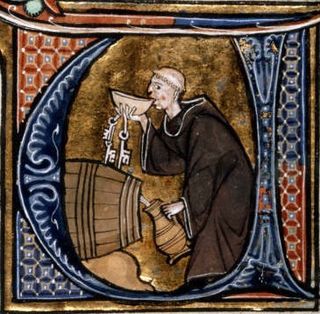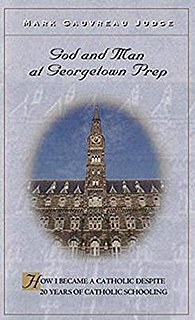Related Research Articles

Drinking games are games which involve the consumption of alcoholic beverages and often enduring the subsequent intoxication resulting from them. Evidence of the existence of drinking games dates back to antiquity. Drinking games have been banned at some institutions, particularly colleges and universities.

Gin is a distilled alcoholic drink that derives its flavour from juniper berries.
"Finnegan's Wake" is an Irish-American comic ballad, first published in New York in 1864. Various 19th-century variety theatre performers, including Dan Bryant of Bryant's Minstrels, claimed authorship but a definitive account of the song's origin has not been established. An earlier popular song, John Brougham's "A Fine Ould Irish Gintleman," also included a verse in which an apparently dead alcoholic was revived by the power of whiskey.

Nonsense verse is a form of nonsense literature usually employing strong prosodic elements like rhythm and rhyme. It is often whimsical and humorous in tone and employs some of the techniques of nonsense literature.

Homebrewing is the brewing of beer or other alcoholic beverages on a small scale for personal, non-commercial purposes. Supplies, such as kits and fermentation tanks, can be purchased locally at specialty stores or online. Beer was brewed domestically for thousands of years before its commercial production, although its legality has varied according to local regulation. Homebrewing is closely related to the hobby of home distillation, the production of alcoholic spirits for personal consumption; however home distillation is generally more tightly regulated.

Tapper, also known as Root Beer Tapper, is a 1983 arcade game developed by Marvin Glass and Associates and released by Bally Midway. Tapper puts the player in the shoes of a bartender who must serve eager, thirsty patrons while collecting empty mugs and tips. It was distributed in Japan by Sega in 1984.

Chicha is a fermented (alcoholic) or non-fermented beverage of Latin America, emerging from the Andes and Amazonia regions. In both the pre- and post-Spanish conquest periods, corn beer made from a variety of maize landraces has been the most common form of chicha. However, chicha is also made from a variety of other cultigens and wild plants, including, among others, quinoa, kañiwa, peanut, manioc, palm fruit, rice, potato, oca, and chañar. There are many regional variations of chicha. In the Inca Empire, chicha had ceremonial and ritual uses.
"99 Bottles of Beer" or "100 Bottles of Pop on the Wall" is a song dating to the mid-20th century. It is a traditional reverse counting song in both the United States and Canada. It is popular to sing on road trips, as it has a very repetitive format which is easy to memorize and can take a long time when families sing. In particular, the song is often sung by children on long school bus trips, such as class field trips, or on Scout or Girl Guide outings.

A beer tap is a valve, specifically a tap, for controlling the release of beer. While other kinds of tap may be called faucet, valve or spigot, the use of tap for beer is almost universal. The word was originally coined for the wooden valve in traditional barrels. Beer served from a tap is largely known as draught beer, though beer served from a cask is more commonly called cask ale, while beer from a keg may specifically be called keg beer. Beer taps can be also used to serve similar drinks like cider or long drinks.

Hires Root Beer is an American brand of root beer marketed by Keurig Dr Pepper. Introduced in 1876, it is one of the longest continuously made soft drinks in the United States.

A keg is a small barrel.
"For He's a Jolly Good Fellow" is a popular song that is sung to congratulate a person on a significant event, such as a promotion, a birthday, a wedding, a retirement, a wedding anniversary, the birth of a child, or the winning of a championship sporting event. The melody originates from the French song "Malbrough s'en va-t-en guerre".
"Godiva's Hymn", "Engineer's Hymn" or "Engineers' Drinking Song" is a traditional drinking song for North American engineers. Versions of it have been associated with the Army Corps of Engineers, as well as MIT, MTU, and various other universities, and is now often performed by the MIT a cappella group The Chorallaries. In many university engineering faculties, military engineering corps and other engineering organizations and societies, Lady Godiva is a school icon or mascot.

Bottle-kicking is an old Leicestershire custom that takes place in the village of Hallaton each Easter Monday. It is an outdoor sport played across a mile-long playing area, in which two teams attempt to move a wooden barrel across the opposing team's stream at the far end of the area.

A Cornelius keg is a stainless steel canister (keg) originally used as containers by the soft drink industry. They can be used to store and dispense carbonated or nitrogenated liquids. Cornelius kegs were originally made by Cornelius, Inc.

"Friends in Low Places" is a song performed by American country music artist Garth Brooks. It was released on August 6, 1990 as the lead single from his album No Fences. The song spent four weeks at number one on the Hot Country Songs, and won both the Academy of Country Music and Country Music Association awards for 1990 Single of the Year.
"Barnacle Bill the Sailor" is an American drinking song adapted from "Bollocky Bill the Sailor", a traditional folk song originally titled "Abraham Brown".
Anti-Scottish sentiment is disdain, discrimination, or hatred for Scotland, the Scots or Scottish culture. It may also include the persecution or oppression of the Scottish people as an ethnic group, or nation. It can also be referred to as Scotophobia or Albaphobia.

The world's religions have had differing relationships with alcohol. Many religions forbid alcoholic consumption or see it as sinful or negative. Others have allocated a specific place for it, such as in the Christian practice of using wine during the Eucharist rite.

God and Man at Georgetown Prep: How I Became a Catholic Despite 20 Years of Catholic Schooling is a 2005 memoir about Catholic school, alcoholism, binge drinking, and hookup culture at Georgetown Preparatory School, written by Mark Gauvreau Judge. The name of the book is a reference to conservative writer William F. Buckley Jr.'s 1951 college memoir God and Man at Yale. Judge had previously written a 1997 memoir about the same institution, Wasted: Tales of a GenX Drunk. He would go on to publish a third book about Catholicism in 2010, A Tremor of Bliss.
References
- ↑ 12.238-239: "Thanks be to God... the start of us"
- ↑ McHugh, Roland (2006). Annotations to Finnegans Wake - Roland McHugh - Google Boeken. ISBN 9780801883828 . Retrieved 2014-06-18.
- ↑ The Hash House Harriers, rugby teams and fraternities all have used versions of the song.
- ↑ Ralph Barton Perry (2012-04-16). "Impressions of a Plattsburg Recruit". The New Republic, Volume 4. Retrieved 2018-09-02– via books.google.com.
- ↑ Brown, William. [from old catalog]; Tuttle, Birdeena, Mrs., [from old catalog] comp (2001-03-10). "The adventures of an American doughboy". Tacoma, Wash., Press of Smith-Kinney co. Retrieved 2014-06-18– via Archive.org.
{{cite web}}: CS1 maint: multiple names: authors list (link) - ↑ Immortalia: An Anthology of American Ballads, Sailors' Songs, Cowboy Songs, College Songs, Parodies, Limericks, and other humorous verses and doggerel was published in 1927 and republished four times in later decades.
- ↑ Adam, Thomas; Kaufman, Will (2005). Germany and the Americas: O-Z. ISBN 9781851096282 . Retrieved 2014-06-18– via Google Books.
- ↑ "There are no Airborne Rangers". ArmyStudyGuide.com. Retrieved 2014-06-18.
Everone [sic]: Sing glorious victorious, one keg of beer for the four of us, praise be to god that there are no more of us, cuz one of us could drink it all alone, damn near pass the beer to rear of the company, hey
- ↑ ""Glorious (One Keg Of Beer For The Four Of Us)" Song Lyrics w/Free MP3 Download". Horntip.com. 2013-09-23. Retrieved 2014-06-18.
- ↑ "SOCIAL REUNION: THE SOUSE FAMILY". The James T. Callow Computerized Folklore Archive, University of Detroit Mercy Libraries & Instructional Design Studio. Retrieved 4 September 2018.
- ↑ ""California Drinking Song" - Cal Songs". University of California Marching Band. 1969-02-18. Archived from the original on 2012-08-18. Retrieved 2012-08-18.
- ↑ steve on the slow train (2009-03-30). "Home in the railroad earth: A Song My Father Taught Me". Ontheslowtrain.blogspot.com. Retrieved 2014-06-18.
- ↑ "Basic lyrics and score". Sniff.numachi.com. Retrieved 2014-06-18.